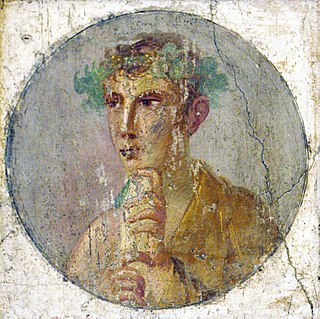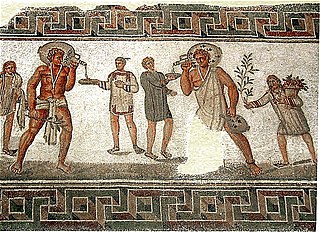
Jurisprudence is the philosophy and theory of law. It is concerned primarily with what the law is and what it ought to be. That includes questions of how persons and social relations are understood in legal terms, and of the values in and of law. Work that is counted as jurisprudence is mostly philosophical, but it includes work that also belongs to other disciplines, such as sociology, history, politics and economics.
Natural law is a system of law based on a close observation of human nature, and based on values intrinsic to human nature that can be deduced and applied independently of positive law. According to the theory of law called jusnaturalism, all people have inherent rights, conferred not by act of legislation but by "God, nature, or reason." Natural law theory can also refer to "theories of ethics, theories of politics, theories of civil law, and theories of religious morality."

Roman law is the legal system of ancient Rome, including the legal developments spanning over a thousand years of jurisprudence, from the Twelve Tables, to the Corpus Juris Civilis ordered by Eastern Roman emperor Justinian I. Roman law forms the basic framework for civil law, the most widely used legal system today, and the terms are sometimes used synonymously. The historical importance of Roman law is reflected by the continued use of Latin legal terminology in many legal systems influenced by it, including common law.

Samuel Freiherr von Pufendorf was a German jurist, political philosopher, economist and historian. He was born Samuel Pufendorf and ennobled in 1694; he was made a baron by Charles XI of Sweden a few months before his death at age 62. Among his achievements are his commentaries and revisions of the natural law theories of Thomas Hobbes and Hugo Grotius.
The pater familias, also written as paterfamilias, was the head of a Roman family. The pater familias was the oldest living male in a household, and could legally exercise autocratic authority over his extended family. The term is Latin for "father of the family" or the "owner of the family estate". The form is archaic in Latin, preserving the old genitive ending in -ās, whereas in classical Latin the normal first declension genitive singular ending was -ae. The pater familias always had to be a Roman citizen.

Sir Henry James Sumner Maine,, was a British Whig comparative jurist and historian. He is famous for the thesis outlined in his book Ancient Law that law and society developed "from status to contract." According to the thesis, in the ancient world individuals were tightly bound by status dealing with(in) a particular group while in the modern one, in which individuals are viewed as autonomous agents, they are free to make contracts and form associations with whomever they choose. Because of this thesis, Maine can be seen as one of the forefathers of modern legal anthropology, legal history and sociology of law.

Francisco de Vitoria was a Spanish Roman Catholic philosopher, theologian, and jurist of Renaissance Spain. He is the founder of the tradition in philosophy known as the School of Salamanca, noted especially for his concept of just war and international law. He has in the past been described by scholars as the "father of international law", along with Alberico Gentili and Hugo Grotius, though some contemporary academics have suggested that such a description is anachronistic, since the concept of postmodern international law did not truly develop until much later. American jurist Arthur Nussbaum noted Vitoria's influence on international law as it pertained to the right to trade overseas. Later this was interpreted as "freedom of commerce".

Citizenship in ancient Rome was a privileged political and legal status afforded to free individuals with respect to laws, property, and governance. Citizenship in Ancient Rome was complex and based upon many different laws, traditions, and cultural practices. There existed several different types of citizenship, determined by one's gender, class, and political affiliations, and the exact duties or expectations of a citizen varied throughout the history of the Roman Empire.
The ius gentium or jus gentium is a concept of international law within the ancient Roman legal system and Western law traditions based on or influenced by it. The ius gentium is not a body of statute law nor a legal code, but rather customary law thought to be held in common by all gentes in "reasoned compliance with standards of international conduct".

Latin rights were a set of legal rights that were originally granted to the Latins under Roman law in their original territory and therefore in their colonies. "Latinitas" was commonly used by Roman jurists to denote this status. With the Roman expansion in Italy, many settlements and coloniae outside of Latium had Latin rights.

In Roman law, status describes a person's legal status. The individual could be a Roman citizen, unlike foreigners; or he could be free, unlike slaves; or he could have a certain position in a Roman family either as head of the family, or as a lower member.
The history of international law examines the evolution and development of public international law in both state practice and conceptual understanding. Modern international law developed out of Renaissance Europe and is strongly entwined with the development of western political organisation at that time. The development of European notions of sovereignty and nation states would necessitate the development of methods for interstate relations and standards of behaviour, and these would lay the foundations of what would become international law. However, while the origins of the modern system of international law can be traced back 400 years, the development of the concepts and practises that would underpin that system can be traced back to ancient historical politics and relationships thousands of years old. Important concepts are derived from the practice between Greek city-states and the Roman law concept of ius gentium. These principles were not universal however. In East Asia, political theory was based not on the equality of states, but rather the cosmological supremacy of the Emperor of China.
The canon law of the Catholic Church is "how the Church organizes and governs herself". It is the system of laws and ecclesiastical legal principles made and enforced by the hierarchical authorities of the Catholic Church to regulate its external organization and government and to order and direct the activities of Catholics toward the mission of the Church. It was the first modern Western legal system and is the oldest continuously functioning legal system in the West, while the unique traditions of Eastern Catholic canon law govern the 23 Eastern Catholic particular churches sui iuris.

Slavery in ancient Rome played an important role in society and the economy. Besides manual labour, slaves performed many domestic services and might be employed at highly skilled jobs and professions. Accountants and physicians were often slaves. Slaves of Greek origin in particular might be highly educated. Unskilled slaves, or those sentenced to slavery as punishment, worked on farms, in mines, and at mills.

Ius or Jus in ancient Rome was a right to which a citizen (civis) was entitled by virtue of his citizenship (civitas). The iura were specified by laws, so ius sometimes meant law. As one went to the law courts to sue for one's rights, ius also meant justice and the place where justice was sought.
While belief in the sanctity of human life has ancient precedents in many religions of the world, the foundations of modern human rights began during the era of renaissance humanism in the early modern period. The European wars of religion and the civil wars of seventeenth-century Kingdom of England gave rise to the philosophy of liberalism and belief in natural rights became a central concern of European intellectual culture during the eighteenth-century Age of Enlightenment. Ideas of natural rights, which had a basis in natural law, lay at the core of the American and French Revolutions which occurred toward the end of that century, but the idea of human rights came about later. Democratic evolution through the nineteenth century paved the way for the advent of universal suffrage in the twentieth century. Two world wars led to the creation of the Universal Declaration of Human Rights.
Jus ad rem is a Latin term of the civil law, meaning "a right to a thing:" that is, a right exercisable by one person over a particular article of property in virtue of a contract or obligation incurred by another person in respect to it and which is enforceable only against or through such other person. It is thus distinguished from jus in re which is a complete and absolute dominion over a thing available against all persons.

History of citizenship describes the changing relation between an individual and the state, known as citizenship. Citizenship is generally identified not as an aspect of Eastern civilization but of Western civilization. There is a general view that citizenship in ancient times was a simpler relation than modern forms of citizenship, although this view has been challenged.
Slavery was common in the early Roman Empire and Classical Greece. It was legal in the Byzantine Empire but it was transformed significantly from the 4th century onward as slavery came to play a diminished role in the economy. Laws gradually diminished the power of slaveholders and improved the rights of slaves by restricting a master’s right to abuse, prostitute, expose, and murder slaves. Slavery became rare after the first half of 7th century. From 11th century, semi-feudal relations largely replaced slavery. Under the influence of Christianity, views of slavery shifted: by the 10th century slaves were viewed as potential citizens, rather than property or chattel. Slavery was also seen as "an evil contrary to nature, created by man's selfishness", although it remained legal.
A contubernium was a quasi-marital relationship in ancient Rome between a free citizen and a slave or between two slaves. A slave involved in such relationship was called contubernalis.